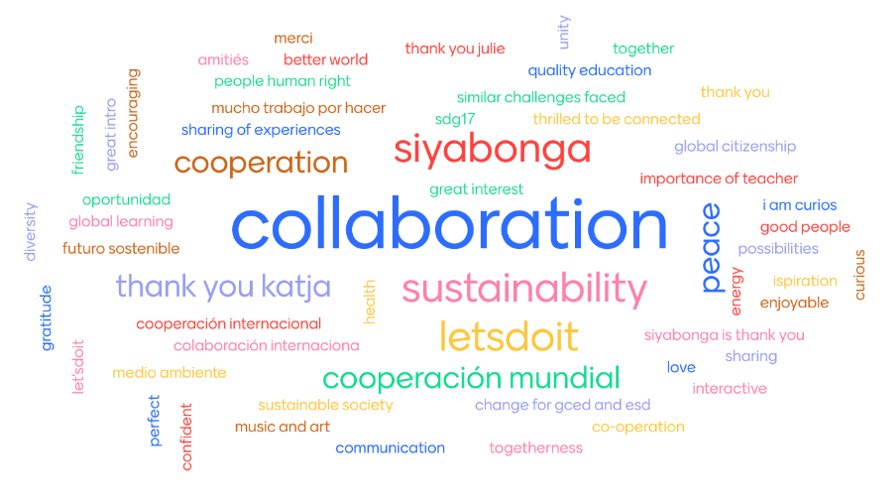The International Coordination Unit of the UNESCO Associated Schools Network (ASPnet) organized a webinar on October 14 to launch the Change Initiative 'Teacher Education & Training Institutions (TEIs) for Global Citizenship Education for Sustainable Development'.

The new initiative is part of the global ASPnet project 'Teacher Training in Support of Global Citizenship Education for Sustainable Development' under the UNESCO - Hainan Provincial People´s Government Fund for ASPnet.
It replaces and expands on the original global meeting of ASPnet TEIs in Nairobi, Kenya, scheduled for April 2020 but cancelled due to the pandemic, and will feature a series of webinars until the end of 2021.
The objective of the initiative is to build a community of practice amongst selected ASPnet TEIs by undertaking (joint) activities to promote and strengthen Global Citizenship Education for Sustainable Development in teacher education and training and, thereby, contribute to fostering global citizens for sustainable development.
Based on a membership mapping of ASPnet TEIs, institutions from Argentina, Belgium, Costa Rica, Cuba, Finland, Germany, Japan, Kenya, Lao People's Democratic Republic, Mexico, Norway, Philippines, Senegal, Sudan, Tanzania, Togo, Uganda and Zambia were nominated to join the Change Initiative.
The participating institutions will individually or collectively define and undertake activities to initiate actual changes in programmes and practices towards Global Citizenship Education for Sustainable Development in their institutions.
Deans, teacher educators and student teachers of the respective TEIs make up the core group of the community of practice and will be supported by experts on GCED, ESD and teacher education and training from all regions, ASPnet National Coordinators, UNESCO colleagues from HQ (ASPnet, GCED, ESD, Teacher Development), Field Offices & Regional Bureaus (Santiago, Bangkok, Nairobi, Harare, Dakar, Abuja, Yaoundé) as well as from Institutes and Centres (International Bureau of Education (IBE), International Centre for UNESCO ASPnet (ICUA), Asia-Pacific-Centre of Education for International Understanding (APCEIU)) - all of whom joined for the very first webinar.
On behalf of Ms Vibeke Jensen, Director of the Division for Peace and Sustainable Development, Ms Cecilia Barbieri, Chief of Section for Global Citizenship Education, explained in her opening remarks: 'Why do we call it Change Initiative? The current crisis has not only brought with it massive change, it has created a window of opportunity for more. We have a chance to bring about real transformative changes that make education systems more just, inclusive and resilient.'
Ms Julie Saito, International Coordinator of ASPnet, welcomed the over 60 participants from 20 countries and UNESCO colleagues from around the world by introducing them with photos and by setting in a presentation the wider framework of the initiative.
'As part of the global project, we are extremely excited today to launch with you the Change Initiative. It is the first time in ASPnet's history that we have set out an initiative focused on you, Teacher Education and Training Institutions,' said Ms Julie Saito, International Coordinator.
After a presentation on statistics from the membership mapping of ASPnet TEIs by Project Officer Ms Katja Anger-Delimi and an introduction to the Collaborative Platform for the ASPnet Change Initiative by Ms Fouzia Belhami, Associate Programme Specialist, the participants got the chance to share their interests, objectives and aspirations for the Change initiative in two group sessions.
A word cloud created by all participants at the end of the first webinar served as a fountain of reflections from the meeting: Collaboration, sustainability, cooperation, peace, curiosity – all key elements of the newly launched Change Initiative.
The next webinar in November aims to build a common understanding of Global Citizenship Education for Sustainable Development (SDG Target 4.7) and will introduce a multidimensional conceptual framework for educational change processes. Good practice examples of TEI Change Projects from UNESCO ROSA Sustainability Starts with Teachers Project and of collaborative efforts amongst TEIs through Japan´s ASPUnivNet will be shared.
Following webinars will support the TEIs to reflect and start designing own activities to bring about change for GCED and ESD in their institutions. A second and third series of webinars is planned in 2021 to exchange and reflect on creative, innovative and meaningful action for effective teacher training and education for Global Citizenship and Sustainable Development and to support and follow up on the projects by the institutions.